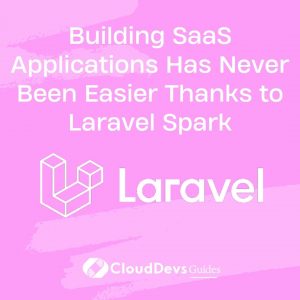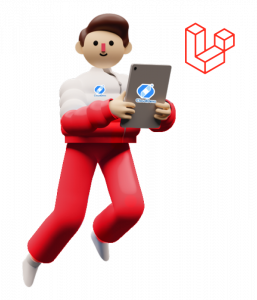Building SaaS Applications Has Never Been Easier Thanks to Laravel Spark
Building Software as a Service (SaaS) applications can be a complex task, requiring the management of numerous features such as subscription billing, user authentication, team management, invoicing, and much more. Fortunately, Laravel Spark, a SaaS application scaffolding for the Laravel PHP framework, provides a quick and easy solution for developers, including those looking to hire Laravel developers. Spark takes care of many of the tedious, repetitive tasks associated with SaaS development, freeing up developers to focus on creating unique and engaging features for their users.
Table of Contents
In this blog post, we will take a closer look at how Laravel Spark can streamline the process of SaaS application development, complete with examples, and insights for those who may wish to hire Laravel developers.
1. What is Laravel Spark?
Spark is a commercial product created by Laravel. It functions as an application scaffold that takes care of many of the common features needed in a SaaS application, such as user authentication, password reset, subscription billing, invoices, team management, and more. It integrates seamlessly with Laravel, a popular PHP framework known for its elegance and simplicity, to provide a solid foundation for building SaaS applications.
Spark allows developers to quickly prototype and deploy SaaS applications, eliminating the need to build common features from scratch. This can save an incredible amount of time and effort, as well as reduce the risk of errors and security vulnerabilities.
2. Setting Up Laravel Spark
To begin using Laravel Spark, you’ll need a fresh Laravel installation and a Spark license, which can be purchased from the Spark website. Once you’ve purchased your license, you can install Spark using Composer:
```bash composer require laravel/spark-installer ```
Next, run the Spark installer:
```bash spark install ```
The Spark installer will ask for your API token. Once you’ve provided that, Spark will be installed in your Laravel application.
3. Spark in Action: Creating a Simple SaaS Application
Let’s now delve into an example of how to build a SaaS application with Laravel Spark. In our example, we will be creating a simple project management app.
3.1. Authentication
With Laravel Spark installed, we can quickly set up authentication using the built-in scaffolding. After running the following command:
```bash php artisan make:auth ```
The application will now have routes, views, and controllers for user registration, login, and password resets.
3.2. Subscription Management
Next, we need to handle subscriptions. Spark provides support for Stripe and Paddle as payment processors. To set this up, head over to the SparkServiceProvider located in the Providers directory and uncomment the billable model lines:
```php
Spark::useBillableModel('App\User');
```
After this, you need to migrate your database:
```bash php artisan migrate ```
In Spark, each type of subscription is called a “plan”. You can configure plans in the `boot` method of your `SparkServiceProvider`:
```php
Spark::plan('Basic', 'basic-monthly')
->price(10)
->features([
'Feature 1', 'Feature 2'
]);
```
3.3. Teams
Spark also provides an easy way to handle teams. To enable teams, go to your SparkServiceProvider and call the `Spark::useTeams();` method. This will automatically set up routes, views, and controllers for team management.
3.4. Invoices
Spark also handles invoices out of the box. Users can download their invoices directly from the application. You only need to add your business details in the SparkServiceProvider:
```php Spark::billsUsingCashier(); ```
This will allow you to configure your billing details, tax percentage, and more.
3.5. Customization
One of the powerful features of Spark is its ability to be customized. For example, if you want to add a project creation feature, you can create a new controller:
```bash php artisan make:controller ProjectController ```
In your new controller, you can handle the logic for project creation, deletion, updating, and more.
Conclusion
By providing a solid foundation, Laravel Spark allows developers, including those you might hire as Laravel developers, to focus on what truly matters: creating unique, engaging features that set their SaaS application apart. The examples provided in this post are just the tip of the iceberg when it comes to what’s possible with Laravel Spark. With this tool in your development toolkit, you can streamline your SaaS development process and bring your application to market faster than ever before.
The next time you’re looking to hire Laravel developers or tasked with creating a SaaS application yourself, remember Laravel Spark. It may just be the key to a faster, smoother development process. Happy coding!
Table of Contents







